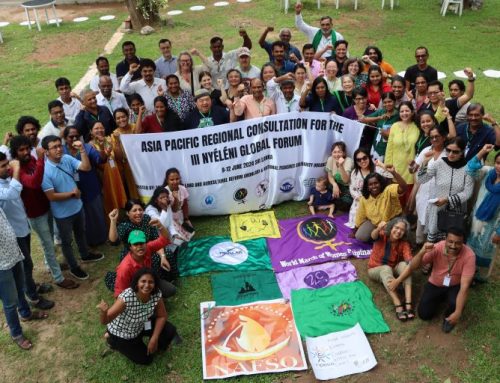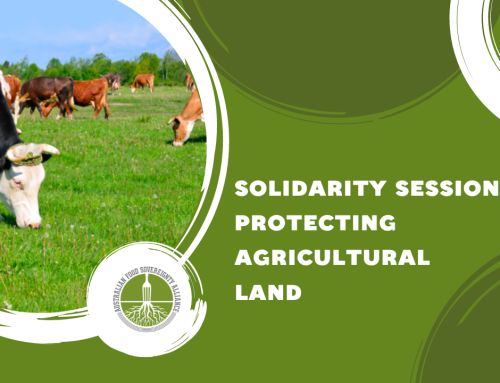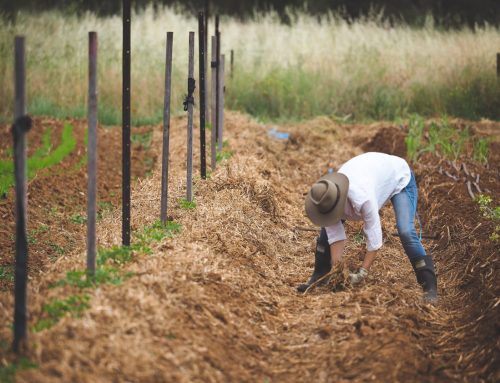RECIPES FOR CHANGE: HOW FOOD IS CHANGING THE CULTURAL AND COMMUNITY LIFE OF CITIES
By Russ Grayson, Journalist and Food Systems Consultant; Member of the AFSA National Committee
In his youth, David McWilliams used to be chased down the street by skinny youths clearly in need of a good feed. Now, when he takes his son to school through the same low-income Dublin neighbourhood, he sees not skinny but overweight youths.
Something had changed and that something is diet and the foods that make it up. “Food has become a class issue… there’s a diet divide in society… the rich are getting thinner while the poor are getting fatter”.
David was speaking at Recipes for change: How food is changing the cultural and community life of cities, a City of Sydney City talk in November this year.
His observation about the obesity of Dublin youths epitomises our global dilemma about the food we eat. It’s a dilemma about producing more and eating less. It’s a challenge of production and consumption, of ensuring everyone has enough good food to eat and also of eating behaviour. At one end of this continuum is the challenge of producing enough food to nourish a global population that could top out at ten billion. At the other it’s about the overproduction and overconsumption of fatty foods and the growth of diet-related diseases such as obesity and diabetes.
Journalist, author and economist, David McWilliams’ message about our food system came packaged in Irish wit. Youngish and dressed in a dark suit that somehow made him look informal, he used video, humour and the keen insight of a journalist to tease out the factors and trends shaping our global food system.
It’s not only in the West that diets have changed. “Some time ago I worked in the bar at a Chinese restaurant and the staff would tell me that I stank… it was all the dairy I ate, they said… they could smell it.
“How times have changed. On a recent visit to China I saw how, with their new wealth, the Chinese now eat large quantities of dairy”.
That dairy, like the rest of the modern, manufactured diet, comes at a cost that is environmental, economic and healthwise, but that is also a potential opportunity cost to our ability to feed a global population whose dietary preferences get more extravagant as its affluence grows.
AVOIDING MALTHUS
“Our challenge”, David told the audience that packed Sydney’s Recital Hall in Angel Place, ” …is producing enough food to avoid a Malthusian Moment in some parts of the world while eating less food to avoid the obesity epidemic in the West”.
A Malthusian Moment… it’s a catchy phrase that David uses to describe how global food production could fall behind the need to nourish a growing population. Malthus was a Nineteenth Century thinker who predicted that the food supply would eventually prove insufficient to feed a growing world population and that, faced with starvation, conflict would ensure. David says that human ingenuity created more food and headed off a Malthusian future, however Malthus was partially right, in his generality.
IRISH POTATOES AND ARAB SPRINGS
David uses the Irish Potato Famine to illustrate what happens when the food supply chain fails. The famine, stemming from a number of factors including a widespread potato disease that devestated the limited number of varieties in cultivation and distortions in the food economy and distribution system led to near starvation and the exodus of thousands of Irish… a worldwide diaspora that sent the Irish to distant countries, including Australia. “I can see many of their descendants sitting in the audience”, David said.
The Arab Spring, too, was influenced by price rises of staple foods. A failing food supply chain fed social unrest, and that suddenly changed everything. We have yet to see the end of the Middle East’s long, hot Spring.
This, and a willingness to engage in military adventures, could be a model for nations with failing food supply chains whether those failures are attributable to crop failure, a warming climate or the peaking of the oil supply which, said David, would not see the unavailability of oil but the unavailability of the cheap oil our food system was built upon. The Green Revolution of the 1960s, which headed off starvation in developing countries by producing new, high-yielding varieties of grain, was built upon the availability of cheap oil for the production of farm inputs such as fertiliser and pesticides that the new crops needed, as well as on irrigation.
SEEKING SOLUTIONS
For David, human ingenuity is what we again need to call upon to effectively address our growing global food dilemma and avoid future Malthusian Moments.
Citing challenges to the world food supply ranging through an increasing shortage of fresh water with which to grow our crops, a changing climate and the influence of financial speculation in the global food supply, David focused on the role of speculators, saying that ” …it’s a case of the richest one percent driving up the price of food for everyone else”.
He thinks that less widespread Malthusian Moments will prompt the development of something like a 20 year global food plan in which Australia will have a part to play.
“Like all crises, the food crisis crept up on us quite quickly”, he said.
“Our challenge is twofold: first, to produce enough food to avoid that Malthusian Moment… that’s a resources challenge; second, to consume less food to avoid the obesity epidemic in the West… and that’s a behavioural challenge.
“We have to find reality… the world as it is, not as we would want it to be. Then we have to do something and face the crisis. When we do that we usually find that problems are solvable”.
Today’s digital interconnectivity, the interconnected citizen, can assist here, David suggested.
Food production and the logistics of a properly functional global food distribution system are technical challenges, however it can be the behavioural challenges that are hardest. Yet, even here the precedence of history offers hope.
“Changing behaviour and food habits requires the right incentives”, said David. “We also need public information. The public campaigns around smoking and wearing seat belts in cars are examples of how behaviour change campaigns can succeed. We can ban fast food advertising, make the wrong foods expensive just as cigarettes were made expensive, introduce penalties for bad behaviour and introduce public policy. We can stablise the incidence of obesity”.
EATERS LIKE CYCLISTS, SAYS LORD MAYOR
Sydney Lord Mayor, Clover Moore, introduced this City Talk on food. Dressed in a bright rEd suit that matched the colour of her lipstick and wearing her signature choker necklace, Clover said it is difficult to change people’s eating behaviours and likened it to educating cyclists and pedestrians to consider each other in their road behaviour.
She mentioned the need to retain Sydney’s urban fringe market gardens to supply the city with locally produced food and sustain the city’s food-based economy. Clover highlighted the attempt of Botany cemetery to take over some of the last commercial market gardens in Sydney’s suburbs—they are located at the southern end of Randwick near Phillip Bay—saying they better serve the city in food production.
Clover said that the NSW government is a big challenge to retaining the urban fringe farming industry because of their proposals for greenfield urban development, however it was the urban lifestyle that the City of Sydney promotes that offers the best future. She spoke of making a city lifestyle even more of an attraction and of its role in retaining the farming viability of the Sydney food bowl, the lands from which much of the city’s sustenance comes from. The denser populations brought by medium and higher density urbanism reduced pressure to develop urban fringe farmland for car-dependent, low-density housing development.
What Clover was suggesting has become widely accepted among urbanists—those who study and plan our cities. Denser urban development and its alleviation of pressure on urban fringe farmlands would contribute to achieving the goals of food advocacy organisations like the Australian Food Sovereignty Alliance and Sydney Food Fairness Alliance that seek to retain a viable urban food economy based on regional production.
The value of urbanism was emphasised by David McWilliams who explained how, globally, Sydney competes with the cities of northern Europe, San Francisco and Vancouver as good places to live.
Supporting continuation of the regional food economy was Sally Hill from Sydney’s Youth Food Movement. The Movement is a new phenomenon in the city that organsies bike-food rides and other activity and is noted for its pizzazz and zest and sense of fun in dealing with the seriousness of the urban food supply.
Speakers and panelists included:
- David McWilliams, economist and social commentator
- Clover Moore, Lord Mayor Sydney
- Justin Hemmes, CEO Merivale
- Ronni Kahn, CEO and founder of food salvage organisation, OzHarvest
- Joost Bakker, Artist, By Joost
- Jared Ingersoll, restauranteur, Danks Street Depot
- Sally Hill, Youth Food Movement
- Jill Dupleix, food journalist, Sydney Morning Herald.
Download the podcast of Recipes for Change




